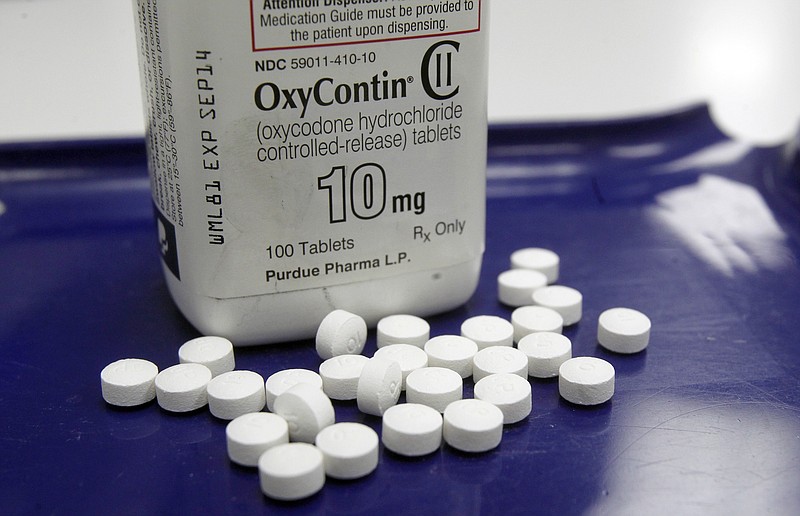President Trump's listeners heard nice words when he spoke about America's opioid crisis Thursday just before he signed a directive declaring the drug scourge a public health emergency - something considerably less than the national emergency he called it in August.
On one hand, it's great that the White House is spending time to spur a national conversation about the opioid epidemic that is estimated to be wrecking the lives of 23 million people.
On the other hand, for now at least, these are words with very little action. And they are words without money to create action. Mostly, it was words intended to make us think he was keeping a promise. Yet another empty promise.
Here's the president's largely hollow plan:
-Bypass a rule that bars Medicaid funding from being used for many drug rehabilitation facilities - the Medicaid plan that continues to be under attack from the president and the GOP.
-Require federally employed prescribers to be trained in safe practices for opioid prescriptions.
-Create a new federal initiative to develop nonaddictive painkillers.
-Produce "really tough, really big, really great advertising" aimed at persuading Americans not to start using opioids in the first place. Perhaps that means a new jingle to join Nancy Reagan's 1986 "Just Say No."
Opioid abuse claimed more than 64,000 lives in 2016 - about 175 people a day - but Trump kicked his promised "national emergency" declaration - one that would include real money to address the problem - right on down the road.
America's opioid epidemic began in the 1990s with the over-prescription of opioid painkillers like Oxycontin and other generic hydrocodones. U.S. doctors were schooled by drug companies (and the so-called experts paid by those drug companies) that these drugs were less addictive than they really are.
In the next decade, some users became addicted, and for many what started with pills became a heroin addiction. In 2014, a synthetic opioid that is 50 times more potent than heroin - fentanyl - came on the scene in a big way, pouring gasoline on the fire. Especially in the Midwest, Appalachia and New England.
Today, drug overdoses have become the leading cause of death among Americans under 50. Overdose deaths rose 19 percent over the 52,404 recorded in 2015. The trend is expected to worsen in 2017.
Health officials say more than 95 million people used prescription painkillers in the past year - more than used tobacco.
So far, the federal government, if anything, has helped the drug makers exacerbate the opioid epidemic.
In 2014, Tennessee's U.S. Rep. Marsha Blackburn, a Republican now seeking Bob Corker's U.S. Senate seat, joined with Rep. Tom Marino, R-Pa., to write a letter accusing then-DEA Office of Diversion Control Joe Rannazzisi of trying to "intimidate the United States Congress." Blackburn and Marino asked for an Inspector General's probe into Rannazzisi - who was issuing fines and trying to make additional cases against pharmaceutical distributors making "suspicious" deliveries of opioids. One example of "suspicious" was 9 million hydrocodone pills delivered over two years to a pharmacy in Kermit, W.Va., where the town's population was just 392 people.
Blackburn, who received $120,000 in campaign contributions from the pharmaceutical industry between 2013 and June 2017, and Marino, who received $92,500, went on in 2015 to push a bill that substantially raised the legal bar on the U.S. Drug Enforcement Administration's ability to crack down on the drug distributors, including the DEA's ability to freeze suspicious shipments. Blackburn and Marino wrapped their bill in the American flag, saying the legislation was needed to help people with pain - like our veterans - have steady access to medication.
The bill passed in 2016 with no opposition in either the House or the Senate. And why not? Overall, the drug industry spent $102 million lobbying Congress on the bill and other legislation between 2014 and 2016, according to a Washington Post review of lobbying reports.
Marino, until last week, was Trump's nominee to lead the Office of National Drug Control Policy. He withdrew his name after Washington Post and "60 Minutes" reports indicated he did the bidding of the pharmaceutical industry in weakening law enforcement's ability to curb black-market opioid sales. The White House has yet to announce a new candidate.
Meanwhile, Blackburn has backtracked: "If there are any unintended consequences from this bipartisan legislation - which was passed unanimously by the House, Senate and was signed into law by President Obama - they should be addressed immediately," her spokesperson said.
Perhaps she might rewrite the legislation? We won't hold our breaths. On Wednesday, at a hearing responding to the investigation by the House Energy and Commerce Committee, Blackburn again pointed the finger at the DEA, according to Nashville Public Radio. She said a formal update about how the new law was working out is six months overdue.
"You've heard the frustration with this panel for not getting information we need from the DEA," she said. "So we're adding this to the list. Where's the report? What's the status of it? When should we receive it?"
DEA officials said they had turned in their portion of the report to the Department of Health and Human Services, which is in charge of putting together the review. HHS, like the Office of National Drug Control that Marino would have headed, also is leaderless after former Secretary Tom Price resigned last month amid revelations he had wasted nearly $1 million in taxpayer money to fly on private and charter jets.
We're glad the president is talking about the opioid crisis. But talk - with few specifics and even fewer tools - is not enough.
